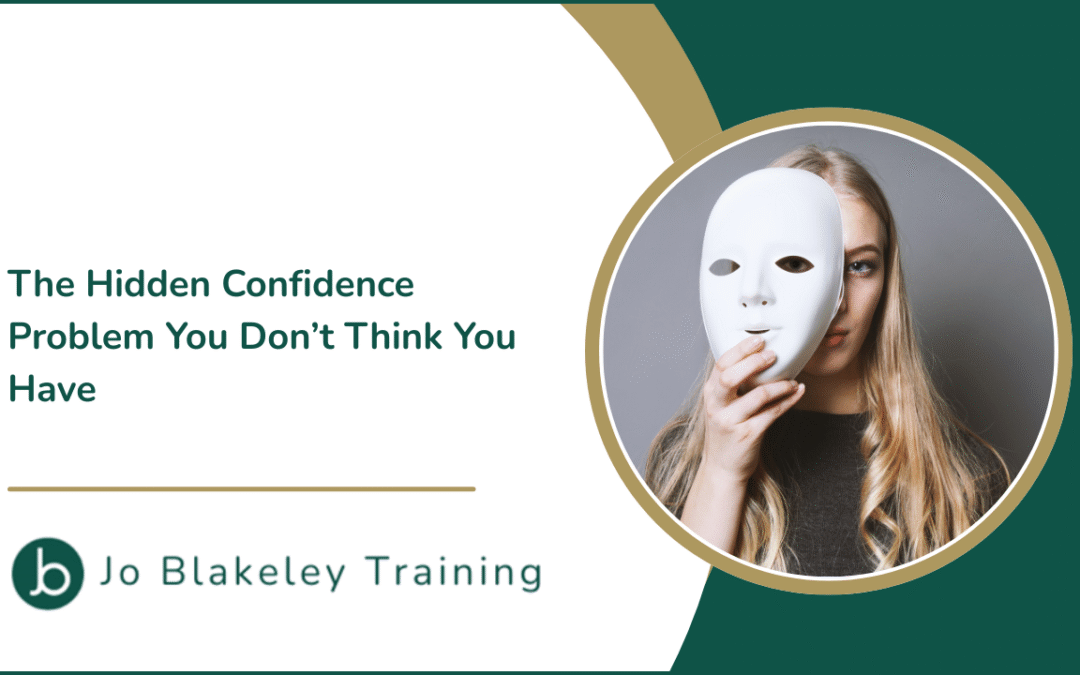Just because someone seems confident, composed, and competent on the outside doesn’t mean they feel it on the inside. That includes your manager. That includes your director.
And sometimes – if you’re honest – that includes you too.
The Thing About Confidence
Confidence can be faked. You can learn how to sound certain, look decisive, and speak with authority, and most people will believe it. But when confidence isn’t real, when it isn’t grounded on the inside, it always finds a way to leak out.
You probably won’t see it in the office, because the leaking usually happens behind closed doors. It looks like:
- Crying in the car after a stressful day
- Sleeping through a long-awaited holiday because of burnout
- Taking days off with ‘a virus’ that isn’t physical at all – it’s emotional depletion
- Drinking or scrolling a little too much to take the edge off
- Secretly relying on caffeine, alcohol, or even work itself to cope
Their team might not notice it. Their boss might not notice it. But they know. And so do the people who love them.
The Mirror Moment
And while you might look up to your manager and think, “They’ve got it all together,” it’s worth asking yourself:
Are there parts of you that you’re hiding too? The things you tell yourself are “fine”, but deep down, you know they’re not?
- Maybe you avoid difficult conversations.
- Maybe you overwork to prove your worth.
- Maybe you keep saying “I’m confident” – when really, you’re just comfortable.
These are the quiet signs of what I call The Unconscious Confidence Gap – the gap between how confident you think you are and how confident you actually feel when things don’t go your way.
The Illusion of Confidence
When I tell people I’ve written The Confidence Breakthrough, I often hear:
“Oh, I don’t need that – I’m already confident.”
And maybe, in some areas, they are. But here’s what I’ve noticed over two decades of working with professionals:
- Many of those same people fall silent in meetings when they’re not the expert.
- They overthink for hours after being challenged.
- They procrastinate on tasks that make them feel exposed.
They can fake confidence when things are familiar, but the moment they step outside their comfort zone, that surface confidence cracks. That’s when I know they don’t have a confidence problem. They have an Unconscious Confidence Gap.
The Psychology Behind It
There’s a concept in learning theory called unconscious incompetence, it’s when you don’t know what you don’t know. It’s the same with confidence. You might think you’re confident because you’ve only ever operated in situations where you feel capable and in control.
But that’s not confidence, that’s comfort.
It’s easy to feel confident when the terrain is familiar. Real confidence is tested the moment the ground moves beneath you.
My Own Wake-Up Call
When I started my career, I thought I was the picture of confidence. I was flying at work – smashing my targets, earning £5,000 a month in commission (which, 25 years ago, felt like a fortune), and being told by everyone how “together” I was.
But behind closed doors? I was going out every night, getting drunk, smoking a packet of cigarettes a day, and crying myself to sleep most nights. From the outside, I looked confident. Inside, I was crumbling.
I didn’t realise then that what I had wasn’t true confidence – it was control. And control only lasts until life tests you.
It took me years to figure out that the real work wasn’t about changing my circumstances, it was about changing my relationship with myself. That’s what eventually became The Confidence Breakthrough – the book and programme I wish I’d had back then.
Closing the Gap
If you’re not sure whether this applies to you, ask yourself:
- Do you only feel confident when you’re the expert?
- Do you overprepare so you don’t risk getting caught out?
- Do you worry more about getting it right than about learning something new?
If yes, that’s your comfort zone talking, not your confidence.
True confidence shows up when:
- You admit when you don’t know.
- You stay calm in uncertainty.
- You trust yourself even when you’re not in control.
Why This Matters
If you’re early in your career, this is the best time to close your own confidence gap – before the habits harden, before you’re too senior to admit you need help, and before ‘faking it’ becomes your default.
Because the higher you climb, the harder it gets to pause, reflect, and rewire what’s happening inside. Real confidence isn’t built by perfecting your image. It’s built by strengthening your inner world so it holds steady when your outer world doesn’t.
The Truth
Most people don’t have a confidence problem, until they face something outside of their comfort zone. That’s when you discover what your confidence is really made of.
👇 Next Week
I’ll be sharing the fundamental principle that explains why this happens, and how your inner world quietly shapes your outer world. (And once you see it, you can’t unsee it.)
💬 If you want to start building real, lasting confidence – the kind that doesn’t crumble when life tests you – you can:
- Join the waitlist for The Confidence Breakthrough Online Programme (joblakeleytraining.co.uk/individual-confidence-breakthrough-programme), or
- Find out more about The Confidence Breakthrough book (joblakeleytraining.co.uk/the-confidence-breakthrough-book)

